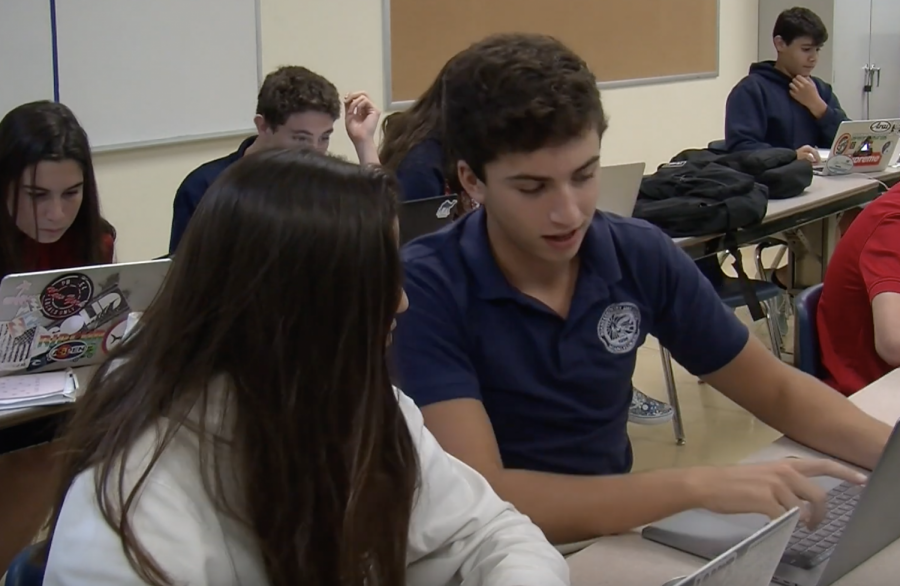Are Introverts at a Disadvantage?
Many Believe They Are
Photograph by G Bruce
Who has the advantage in the classroom: introverts or extoverts?
Do students who consider themselves extroverts have an advantage here? If you’re an introvert, do your grades suffer? Does our school subscribe to the “extrovert ideal”? In this thought-provoking report, journalist student and Spartacus staff writer Giulianna Bruce asks teachers and students who they think has the upper hand in the classroom.
In a recent survey sent to upper school students asking them to identify as “introvert” “extrovert” or “ambivert”, nearly 80% of those participating responded that they consider themselves a solid introvert or a mix of both. Only 20% identify as being extroverted. Clearly many students, therefore, have more quiet tendencies. While this isn’t surprising, it does lead us to question why teachers force group collaboration and use methods like “Socratic seminars” which favor those who speak loudest. It also leads to the question: Is our learning environment as balanced as the personalities of our school body?
Author Susan Cain describes what she calls the “extrovert ideal” in her book Quiet. The ideal “self” is one who is gregarious and comfortable in the spotlight and is something, she argues, that has become an American ideal. This belief has been embraced in classrooms across the country and may put some students at a disadvantage.
Sophomore Mia Batista feels that “after knowing that only 20% of our students feel they are extroverts, I believe that the learning environment at MCDS is not representing our demographic.” She feels that the participation points in some of her classes, which count on one’s being outspoken in class, put those who are quieter at a disadvantage. Freshman and “A” student Sophia Tilis considers herself “more of an introvert” and feels anxiety about speaking sometimes hurts her. “If I’m pressured to get called on, I’ll freeze and maybe panic and I won’t be able to answer the question.” The other side of this, however, may be that high school is a time for students to reflect on the kind of learning environment that suits them best. In order to know that, one needs to experience all kinds of situations. But perhaps there is a better balance.
Produced for Spartan TV at Miami Country Day School, Miami Florida.

Giulianna Bruce is a senior at MCDS and she’s so excited to be this year's Editor-in-Chief of The Spartacus! Giulianna joined three years ago with the...












Karen Davis • May 24, 2019 at 11:02 am
I love the question she poses: Is our learning environment truly as balanced as the personality traits of our students? I agree that there are many ways to value and grade “participation” and that perhaps more teachers should take a more balanced approach. I like to think of participation in my classes as having multiple components– engagement with the materials and others being the top. It’s not about who is loudest.
Nadia Zananiri • May 24, 2019 at 10:56 am
As an instructor it can be difficult to balance the different personality types in the classroom. Many times in verbal discussions the loudest and most extroverted students dominate the conversation. I like to use an online discussion forum where students can type out their response to make sure all of the voices in the room have a chance to respond and reflect. It also allows students the opportunity to comment on each other’s posts without sidetracking the conversation. This can also be achieved without technology by either randomly pulling students names from a bag/box and/or letting students respond on index cards. It’s important to acknowledge the contributions of introverts to a classroom, they often have well thought out and unique perspectives which can enhance the learning experience.
Kristina Martinez • May 24, 2019 at 10:53 am
So many of us make participation a priority in our classes, some of us attaching grades to a student’s willingness to offer ideas, make comments, and ask questions. Having a conversation about how we define participation might be useful. Are we simply rewarding those students who are quickest to chime in and share thoughts? How might we acknowledge those students, for whom listening is paramount? If, in the end, we are a school that wishes to encourage thoughtful and respectful dialogue, in and out of the classroom, we must make room for listening and the quiet space listening often demands.